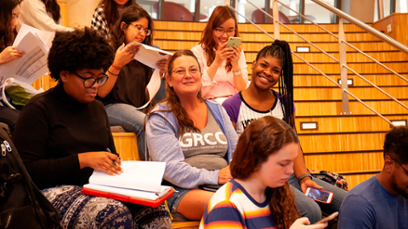UASNL: 'internationalisation for peace’
6 May 2024 16:36 | CommunicationUASNL (Universities of Applied Sciences Netherlands) calls out for a long-term vision on internationalisation. U!REKA endorses this plea.
Over the past year, the discussion on the quantity of international students has come to a peak, prompted by issues of housing and full classrooms. These are important topics, but in the discussion of these topics our position as a country driven by knowledge, and the role of an environment in which everyone can participate are often overlooked. In such an environment everyone is invited to be open to the perspectives and opinions of others. Should we leave this out of the discussion on international students, then an essential role of this new generation will be underplayed: to keep the peace in the long run.
Don't just think about short-term effects of internationalisation
Of course, educational institutions also have concerns about housing or full classrooms, but these are problems that we as a society can easily resolve in the span of half a generation. That is precisely why we should not let them prevail over the long-term effect of internationalisation and an international student population: connecting people. Where current geopolitical developments actually reinforce segregation, especially education as a soft power can continue to connect across borders. And breaking through that segregation encourages peace.
For education, this means showing students how to take an interest in other groups, in people from different cultural backgrounds and in the history of other countries. In doing so, a student develops an understanding and respect for that culture and learns what prosperity means to others. If we don't, we exclude groups and fail to understand each other in the long run. This not only weakens our position as a knowledge and trading partner, but also makes us less inclined to share prosperity with each other.
Internationalisation for peace
From a financial perspective, too, our international knowledge economy is actually valuable. Our strength as a trading country is rooted in our international relations, for instance with the many international alumni who serve as 'Holland ambassadors'. Also, the international alumni who continue to work in the Netherlands (In the case of technical studies this is up to 40 percent) contribute over 1.5 billion euros to the Dutch public purse. Therefore, our top position as a qualitative international education country is a trump card.
The discussion on internationalisation is thus about much more than receiving and supporting international students in the Netherlands. It is about the need to bring students, Dutch and international, into contact with each other and to develop respect for each other's views on personal development and prosperity. That is good for personal development and even essential for maintaining peace in the longer term.
On behalf of the board of UASNL
Geleyn Meijer – member/Dean Executive Board, Amsterdam UoAS
Elisabeth Minnemann – chair of the Executive Board, The Hague UoAS
Dick Pouwels – chair of the Executive Board, Hanze UoAS


